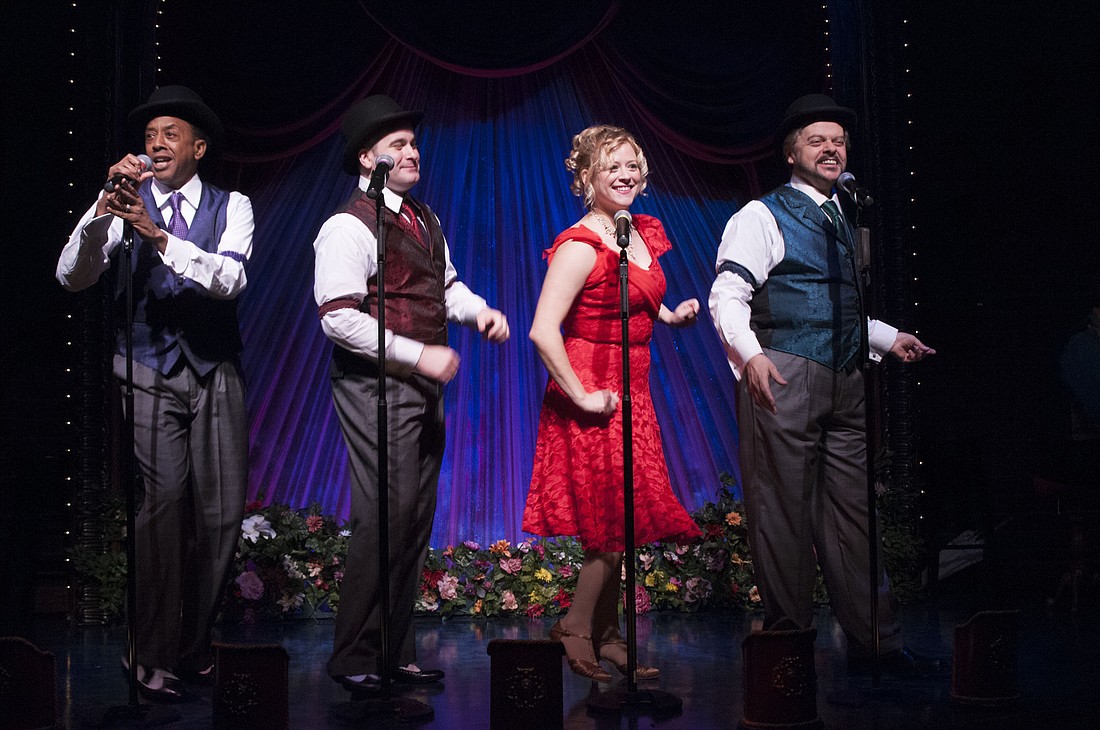- November 23, 2024
-
-
Loading

Loading

Vaudeville is dead, if unquietly so. Like Elvis, it refuses to stay put in its grave. Sightings abound. Most recently, at “Never Marry a Girl with Cold Feet and Other Life Lessons from Vaudeville,” Florida Studio Theatre’s latest cabaret production. So what is vaudeville? Here’s a better question …
“What isn’t vaudeville?”
If variety is the spice of life, vaudeville is a bowlful of jalapeño peppers. Born in the mid-19th century, this all-American art form was a grab-bag of acrobatics, animal routines, comedy, contortion, dance, escape-artistry, ethnic acts (either nostalgic to offensive), plate-spinning, schmaltz, shtick, sex jokes (nudge, nudge), songs and ventriloquism. Troupes of itinerant performers kept it going.
To fit this multifaceted phenomenon on a cabaret stage, the revue’s creators (Richard Hopkins, Rebecca Hopkins, and Jim Prosser) wisely narrow it down to songs with a side helping of jokes and patter. Seeing as how Fanny Brice, George M. Cohan, Jerome Kern, and Al Jolson are touring in the Great Road Show in the Sky, Richie McCall, Eric Collins, Ali Reed and Gary Marachek do the singing, backed up by the indefatigable Prosser on piano.
The experience is fun — and not the usual. Here in the early 21st century, live music varies between overpriced arena concerts (where the gods of rock and pop lord it over their screaming, merely human fans), to bar bands (whose underpaid musicians provide a background soundtrack for sloshed patrons) to polite sit-and listen concerts (where audiences act like they’re in church). On the FST cabaret stage, the resurrected vaudeville experience is more like an old-time British musical hall. There’s an intimacy between performers and patrons. And even the occasional sing-along. (Usually on the choruses, when audiences know the words.)
The words in question reflect their time. The mood of America’s bygone popular mind could be relentlessly upbeat (like Irving Berlin’s “Alexander’s Ragtime Band”); aggressively patriotic, (like George M. Cohan’s “Over There/Yankee Doodle Dandy,” the great jingoistic jingle for the Great War); side-splittingly funny (Ed Gallagher and Al Shean’s “Mister Gallagher & Mister Shean” always put a smile on Groucho’s face — and does the same for audiences today); shamelessly romantic (Robert Byrne and Tom Brasfield’s “Once in a Blue Moon” still plucks the heartstrings); and occasionally cringe-worthy (like Joe Young, Sam Lewis, and Walter Donaldson’s “My Mammy,” the song that made Al Jolson famous — in blackface).
But let’s leave the minstrel show influence in the recycling bin of history. With a little airbrushing, vaudeville music is still a lot of fun. After all, that’s what it was for. It’s the music of parades, picnics and porches; a soundtrack for a Ray Bradbury story; an excuse for an innocent kiss. Feel-good music? You bet. Escapist? Why not?
Have you seen CNN lately?
McCall, Collins, Reed, Marachek and Prosser offer escape into a nostalgic dream of the past with the power of song alone. It’s a dream of a world without terrorists making YouTube videos and nuclear-armed dictators making threats. A simpler time. (Well, maybe not. But it’s pretty to think so.)
As to the un-airbrushed past? Yes, Virginia …
Vaudeville died.
The movies killed it in the early 1930s. But as Hollywood taketh away, so Hollywood also giveth. Vaudeville’s jokes and shtick lived on, thanks to comedians like W.C. Fields and the Three Stooges. The music endured, too. Together with Oscar Hammerstein II, Jerome Kern (of “Never Marry a Girl with Cold Feet” fame) basically invented the American musical with “Show Boat” in 1927. Every musical since has a little vaudeville in its blood. Vaudeville is dead …
Long live vaudeville.